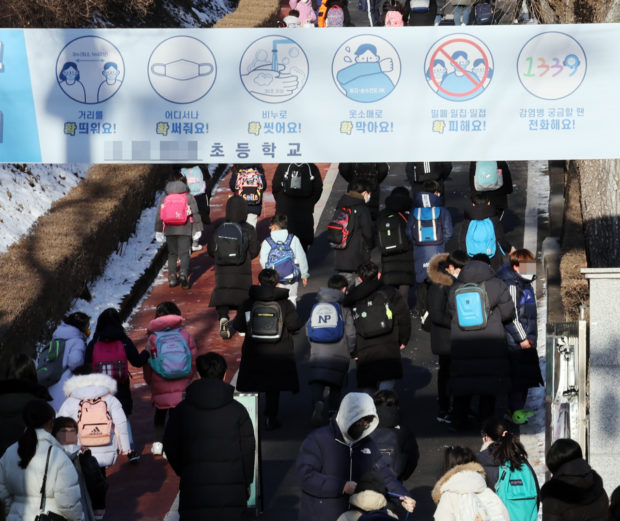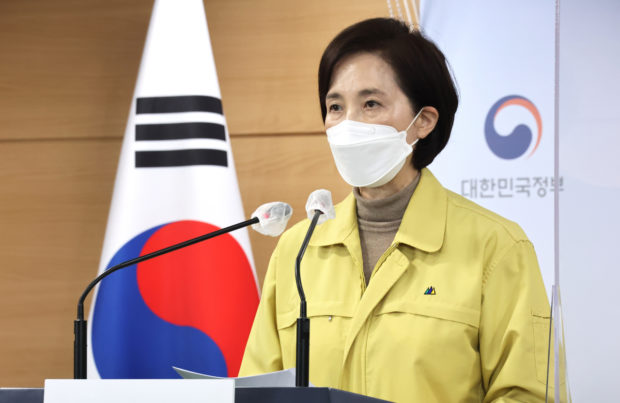Facing Omicron wave, S. Korean schools shift to ‘normalcy’

Students attend an elementary school in Seoul, Monday. The Ministry of Education announced new measures for schools set for the new semester in March, including new testing protocols and four-stage standards for shifting to online classes. (Yonhap via The Korea Herald/Asia News Network)
SEOUL — The Ministry of Education of South Korea on Monday announced new COVID-19 protocols for schools, stressing that the four-stage plan is aimed at achieving “normal” attendance from March.
“We are preparing for the new semester as if we are the parents of students,” Education Minister Yoo Eun-hae said during a press briefing held at the government complex in central Seoul, Monday. “It is difficult to say that schools will return to normalcy by March. It, however, is important for students to fully return to schools to recover the losses in the past two years.”
“The Education Ministry will transition to a response system that lowers the risk of school transmissions, newly introducing rapid antigen testing and rapid PCR testing, providing the needed supplies for the infectious disease control, while allowing schools to respond to virus situations flexibly on the scene,” Yoo said.

Education Minister Yoo Eun-hae speaks during a press briefing held at the government complex in Gwanghwamun, central Seoul, Monday. (Yonhap via The Korea Herald/Asia News Network)
Over the past two years, students and parents have complained about schools having to flip-flop between online and offline classes.
To minimize uncertainty, the Education Ministry has devised a four-stage system for responding to the virus crisis at schools.
Article continues after this advertisementAt Level 1, schools run both classes and extracurricular activities. At Level 2, classes will run as usual, however extracurricular actives such as club activities and afterschool classes will be restricted. Under Level 3, schools will go hybrid, operating online and offline classes to limit the number of students in classrooms and at Level 4, schools will go completely online.
Article continues after this advertisementIf the number of daily confirmed cases in schools surpasses 3 percent of the total students or the number of those who have been restricted from attending classes surpasses 15 percent, schools can shift to Level 2. When schools pass both criteria simultaneously, they can move to Level 3. To go completely online, the number of confirmed cases in students should be relatively significant compared to the total confirmed cases in the community.
“Though we have set the standards, each school can decide on their own when it comes to going online, flexibly responding to the situation,” an official from the Education Ministry said, adding that it is possible to have a grade go online while students of other grades attend classes in person.
Schools will set their own standards with “Business Continuity Plan,” an emergency response plan regarding the pandemic crisis, the ministry said.
As Korea has now limited PCR testing to certain groups, the ministry will support schools to adapt to the new testing measures.
Those who have come in close contact with a confirmed case but do not show symptoms or are deemed low-risk will be required to undergo a rapid antigen test three times in seven days before they are allowed to return to schools.
Schools will provide the kits to students to test themselves at home. The ministry said it has secured “enough” test kits in cooperation with the Ministry of Food and Drug Safety, and expects to use some 6.5 million kits from February to March.
As of Friday, 75.3 percent of youths aged between 13 and 18 have received two doses of COVID-19 vaccines.
With the Omicron wave rapidly spreading across South Korea, the confirmed cases in youths have been on the rise. In the fifth week of December, 14.6 confirmed cases were reported per 100,000 youths aged 18 or under, the number increased to 40 by the fourth week of January.
RELATED STORIES
South Korea pushes to treat COVID-19 like flu
South Korea to expand in-person classes for younger students this year
South Korean teens drive up COVID-19 cases ahead of full school reopening
South Korea court exempts teens, supermarkets from vaccine passes
For more news about the novel coronavirus click here.
What you need to know about Coronavirus.
For more information on COVID-19, call the DOH Hotline: (02) 86517800 local 1149/1150.
The Inquirer Foundation supports our healthcare frontliners and is still accepting cash donations to be deposited at Banco de Oro (BDO) current account #007960018860 or donate through PayMaya using this link.